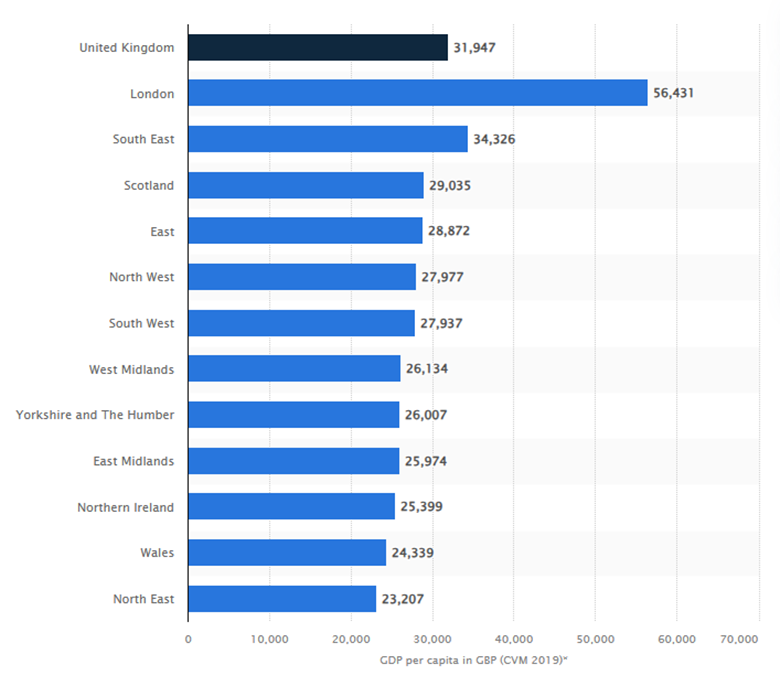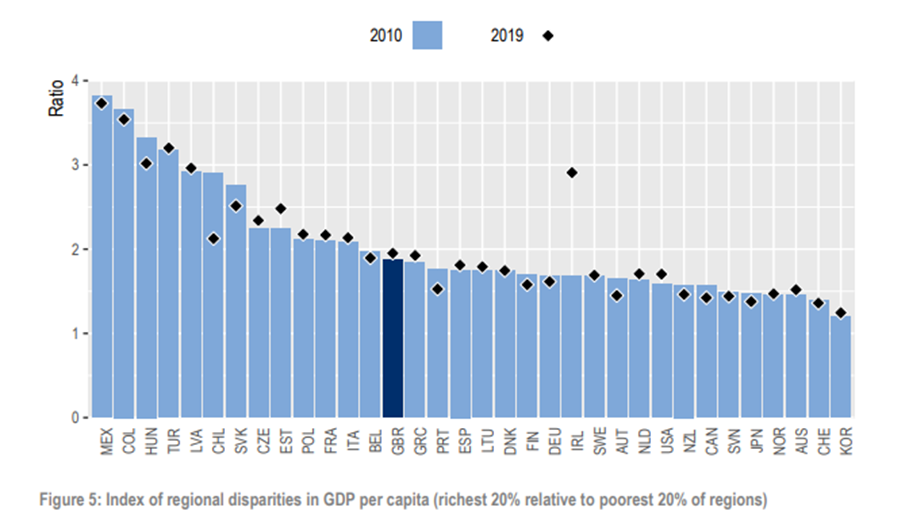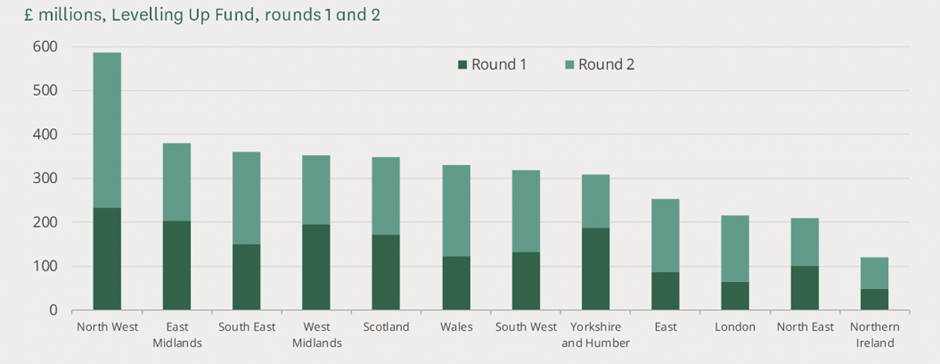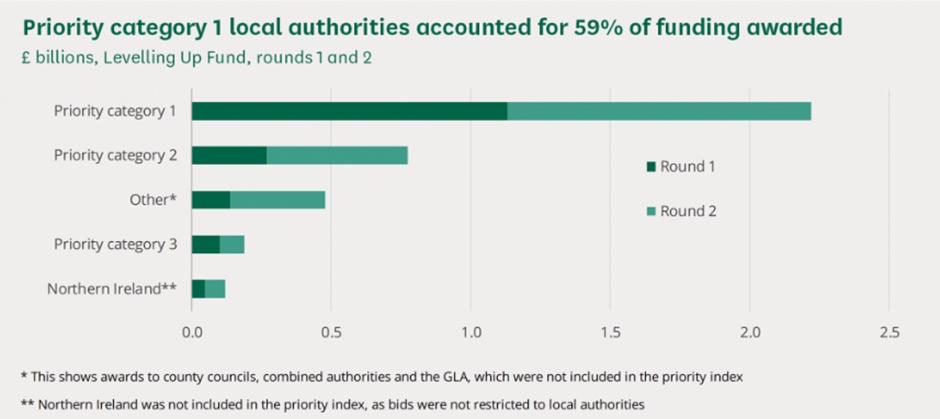UK is actively pursuing policies to reduce regional disparities
Various implications for Korea’s balanced regional development project
The UK has recently been taking active steps to resolve the problem of uneven development between regions that has persisted for a long time. Through the 'Leveling Up' policy that has been implemented since 2020, mid-term goals have been established until 2030, and various tasks for regional standardization are being carried out.
Deep-rooted regional imbalance problem
Unbalanced development between regions in the UK is one of the social problems that has been continuously discussed in the past. In particular, there are significant differences between London and the south-eastern region and the remaining left-behind areas in many aspects, including income and productivity, infrastructure, and living standards.
Comparing per capita GDP (productivity index) by region, we can see that only London and the southeast region are above the average for the entire UK, while the remaining regions are below the average.
< Comparison of GDP per capita by UK region, as of 1 >
(Unit: pounds)
[Source: Statista]
In addition, according to the OECD's comparative survey of regional imbalances by country, the UK ranked 20th overall in the difference in GDP per capita between the top 20% and bottom 1% regions.
< Level of regional imbalance by country compared between the top 1% and bottom 20% of GDP per capita >
[Source: OECD]
Leveling Up
Accordingly, the British government is promoting the Leveling Up policy to improve underdeveloped areas and reduce regional disparities. The purpose is to enable all regions to live more prosperous lives by raising productivity, public services, and quality of life in underdeveloped regions to the UK average. The British government has reorganized the relevant government department into the 'Department for Leveling Up, Housing and Communities' and is showing a strong will to promote policies to resolve regional imbalances (*Note: The previous name was ‘Department for Housing, Communities and Local Government’).
Leveling Up consists of four main areas and 4 sub-tasks. Tasks are largely divided into living standards, research and development, transportation infrastructure, digital connectivity, education, technology, health, well-being, regional pride, housing, crime, and regional leadership, and detailed implementation plans are being established and promoted for each task.
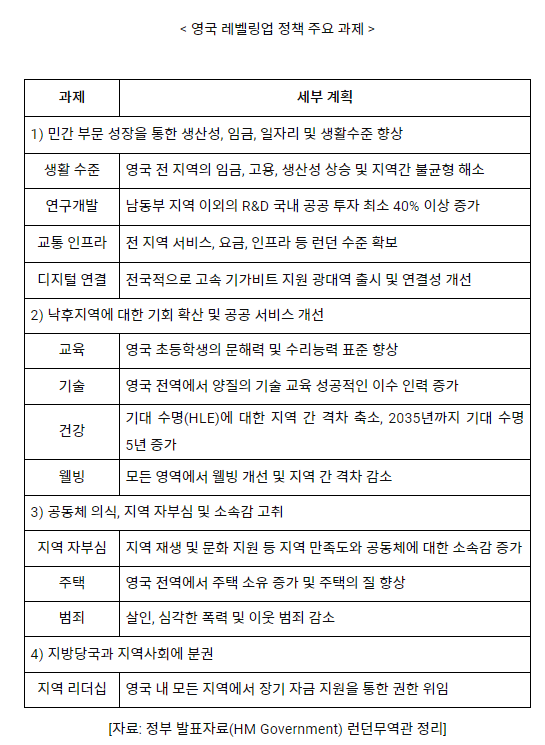
Leveling Up Fund – Community-led (localism)) Policy
One focus of the leveling up policy is community-led project decision-making. The Leveling Up Fund, which aims to invest in improving community infrastructure, supports investment projects in each region (a total of 48 billion pounds), and project selection is based on regional priorities and a bidding competition between local authorities. Priorities are ranked from 1 to 3 depending on the level of underdevelopment of the region, and the appropriate scale and the suitability and feasibility of the projects submitted by each local authority are evaluated in various ways to select them. By having local authorities directly submit the projects that each region needs most, each region can take the lead in applying for and promoting the projects that are most necessary and appropriate for their region. Therefore, the Leveling Up Fund is commonly used to regenerate local cities and improve infrastructure, but its specific use is determined differently depending on regional circumstances.
In the first round of project selection in 2021, a total of 1 projects and a fund worth 105 billion pounds were supported. The three areas of priority support were economic recovery and urban regeneration (17%), transportation improvement (57%), and cultural investment (26%).
In the first round of project selection, the North West (1%), Yorkshire and Humberside (13.79%), and East Midlands (12.86%) received the largest amount of support. Comparing policy priority areas (underdeveloped areas) and areas selected for primary investment projects, we can see that many projects were generally supported in underdeveloped areas such as the North West, East Midlands, and Wales.
The second round of selected projects for the Leveling Up Fund, promoted from 2022 to 2023, focused on the same three topics as the first round, and a total of 2 projects were invested worth 1 billion pounds.
Key projects include the expansion of bus services in West Yorkshire (£4 million), the town center regeneration of Accrington, North West (£2 million) and the Rand of Porthcawl, South Wales. Mark Grand Pavilion reconstruction (1,800 million pounds) was selected.
The comprehensive results of the 1st and 2nd projects show that, in general, a large amount of money was provided to underdeveloped areas (priority scale group 1). The regions that received the most funding were the North West, East Midlands, and South East, with approximately 1% of the total amount being provided to the most underdeveloped regions designated as Group 59.
< Distribution of 1st and 2nd Leveling Up Fund investment projects by region >
(Unit: million pounds)
[Source: Department for Leveling Up, Housing and Communities]
< Status of 1st and 2nd leveling-up fund investment project support by regional priority category >
(Unit: billion pounds)
[Source: Department for Leveling Up, Housing and Communities]
The British government is currently preparing to bid for the third investment project in 2023.
implication
The UK's proactive policy of resolving regional imbalances has significant implications for Korea. Korea also belongs to a country with a large regional imbalance, with half of the population concentrated in the metropolitan area and more than half of companies and jobs also concentrated in the metropolitan area. There is also a large gap in GDP per capita and living infrastructure between the metropolitan area and non-metropolitan areas.
Korea has also consistently promoted related policies to resolve this regional imbalance. In particular, with the goal of realizing a 'local era in which all citizens enjoy equal opportunities regardless of where they live', the Local Era Committee was launched last July and a blueprint was drawn to promote autonomous decentralization and balanced national development in an integrated manner. The UK's movement to resolve regional gaps based on regionalism has many implications for urban regeneration based on 'regional autonomy' in Korea's successful promotion of regional balanced development policy.
In addition, opportunities for Korean companies to enter the market can be seen in the UK's policy implementation process. In particular, in relation to expanding digital connectivity and narrowing the digital gap between regions during the leveling up policy, the British government set a goal of making gigabit broadband available throughout the UK by 2030 and mandated gigabit broadband connections in new homes. As a result, gigabit broadband coverage is rapidly increasing even in digitally underdeveloped areas.
Under this actively promoted regional gigabit broadband support project, Korean companies with excellent ICT technology are expected to be able to seize new opportunities, such as expanding their participation in the digital procurement market in the UK.
*Data source: UK government website (GOV.UK), Statista, OECD, etc.




